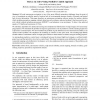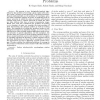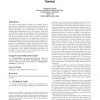24 search results - page 3 / 5 » Optimal control of a quasi-variational obstacle problem |
AROBOTS
1998
13 years 6 months ago
1998
Off-road autonomous navigation is one of the most difficult automation challenges from the point of view of constraints on mobility, speed of motion, lack of environmental structur...
AHSWN
2006
13 years 6 months ago
2006
Abstract-- We present a new, biologically-inspired algorithm for the problem of covering a given region with wireless "units" (sensors or base-stations). The general prob...
GECCO
2005
Springer
13 years 12 months ago
2005
Springer
The need to build modular, scalable, and complex technology capable of adaptation, self-assembly, and self-repair has fuelled renewed interest in using approaches inspired by deve...
ICML
1996
IEEE
13 years 10 months ago
1996
IEEE
This paper presents a direct reinforcement learning algorithm, called Finite-Element Reinforcement Learning, in the continuous case, i.e. continuous state-space and time. The eval...
RSS
2007
13 years 7 months ago
2007
— Multi-robot systems require efficient and accurate planning in order to perform mission-critical tasks. However, algorithms that find the optimal solution are usually computa...




